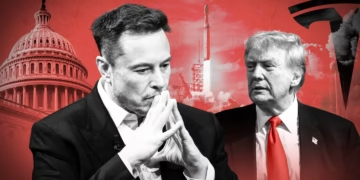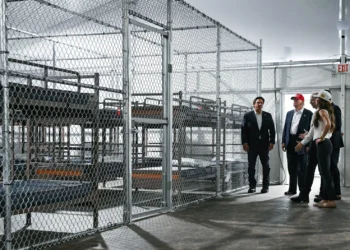The recent Canadian federal election has brought to the forefront the Canada-US political tension, with Mark Carney’s significant win. During Carney’s victory speech, a candid message was delivered to Canadians regarding the challenges posed by the current US administration under Trump.
The implications of Carney’s message are profound, highlighting the strained Trump-Canada relations and the potential impact on Canada’s future. As the dust settles on the election, it’s clear that Carney’s leadership will be crucial in navigating these complex Canada-US political tensions.

Key Takeaways
- The Canadian federal election outcome is seen as a significant development in the context of Canada-US relations.
- Carney’s victory speech addressed the challenges posed by Trump’s administration.
- The Canada-US political tension is expected to continue, with implications for trade and diplomacy.
- Carney’s leadership is crucial in navigating the strained Trump-Canada relations.
- The election result reflects Canadians’ stance on the current US administration.

Mark Carney’s Unprecedented Rise to Power
Mark Carney’s journey from a central banker to the Prime Minister is a tale of unprecedented success. With his victory in the 2025 Canadian election, Carney has not only made history but also set a new precedent in Canadian politics.
From Central Banker to Prime Minister
Carney’s career trajectory is marked by significant milestones. His tenure at the Bank of Canada and later at the Bank of England established him as a formidable figure in global finance.
Career at Bank of Canada and Bank of England
At the Bank of Canada, Carney played a crucial role in navigating the country through economic challenges. His subsequent appointment as the Governor of the Bank of England further cemented his reputation as a skilled central banker. Key achievements include:
- Successfully managing inflation rates
- Implementing monetary policies to stabilize the economy
- Enhancing the global financial stability framework
Transition to Canadian Politics
Carney’s transition into Canadian politics was met with both curiosity and skepticism. However, his expertise and international reputation quickly gained him traction among Canadian voters.
The Significance of a Political Newcomer’s Victory
Carney’s win signifies a break from traditional political pathways. His victory is a testament to the public’s desire for fresh perspectives and effective leadership.
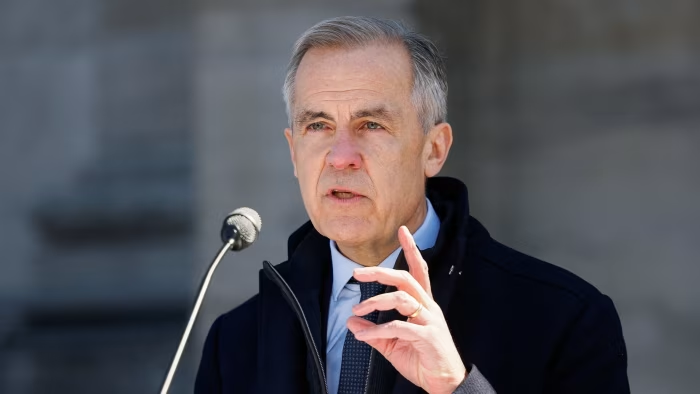
Breaking Traditional Political Pathways
By entering politics without prior experience in elected office, Carney has challenged conventional norms. This has resonated with a public looking for change and innovative solutions.
Public Perception of Carney’s Expertise
The public has largely viewed Carney’s financial expertise as a valuable asset. His ability to navigate complex economic issues has been seen as a significant advantage in addressing Canada’s economic challenges.
The 2025 Canadian Election Results: A Comprehensive Overview
Canada’s political landscape witnessed a significant shift in the 2025 election, with the Liberal Party emerging victorious under Mark Carney’s leadership. The election results marked a new chapter in Canadian politics, with various factors contributing to the outcome.

Liberal Party’s Return to Power
The Liberal Party, led by Mark Carney, secured a victory in the 2025 Canadian election, regaining power after a closely contested battle. The party’s success can be attributed to its effective campaign strategies and the public’s response to their policies.
Key Ridings and Vote Distribution
The Liberal Party performed well in key ridings, securing crucial votes that contributed to their overall success. The vote distribution across different regions highlighted the party’s strong presence.
| Riding | Vote Percentage | Outcome |
|---|---|---|
| Urban Centers | 45% | Liberal Win |
| Rural Areas | 30% | Conservative Stronghold |
Comparison to Previous Elections
Compared to previous elections, the 2025 results showed a significant shift in voter preferences, with the Liberal Party gaining ground in areas previously dominated by other parties.

Conservative Party’s Gains and Losses
The Conservative Party experienced both gains and losses in the 2025 election, with notable performances in certain regions. Despite not securing the majority, the party maintained its presence in key areas.
Strongholds in Alberta and Rural Areas
The Conservative Party retained its strongholds in Alberta and rural areas, where it enjoyed significant support from local voters.
Breakthrough in Toronto Suburbs
The party also achieved a breakthrough in the Toronto suburbs, a region that has been a battleground in recent elections.
“The 2025 election was a testament to the evolving dynamics of Canadian politics, with both the Liberal and Conservative parties adapting to changing voter sentiments.”
The Changing Landscape of Canadian Politics
The 2025 election results underscored the changing landscape of Canadian politics, with emerging trends and shifting voter preferences. The outcome highlighted the need for political parties to adapt to these changes.
In His Victory Speech, Mark Carney Warns Canadians That “Trump Is Trying to Break Us”
During his victory speech, Mark Carney issued a stark warning about the dangers Donald Trump poses to Canada. This statement was not only a reflection of Carney’s concerns but also a call to action for Canadians to remain vigilant.
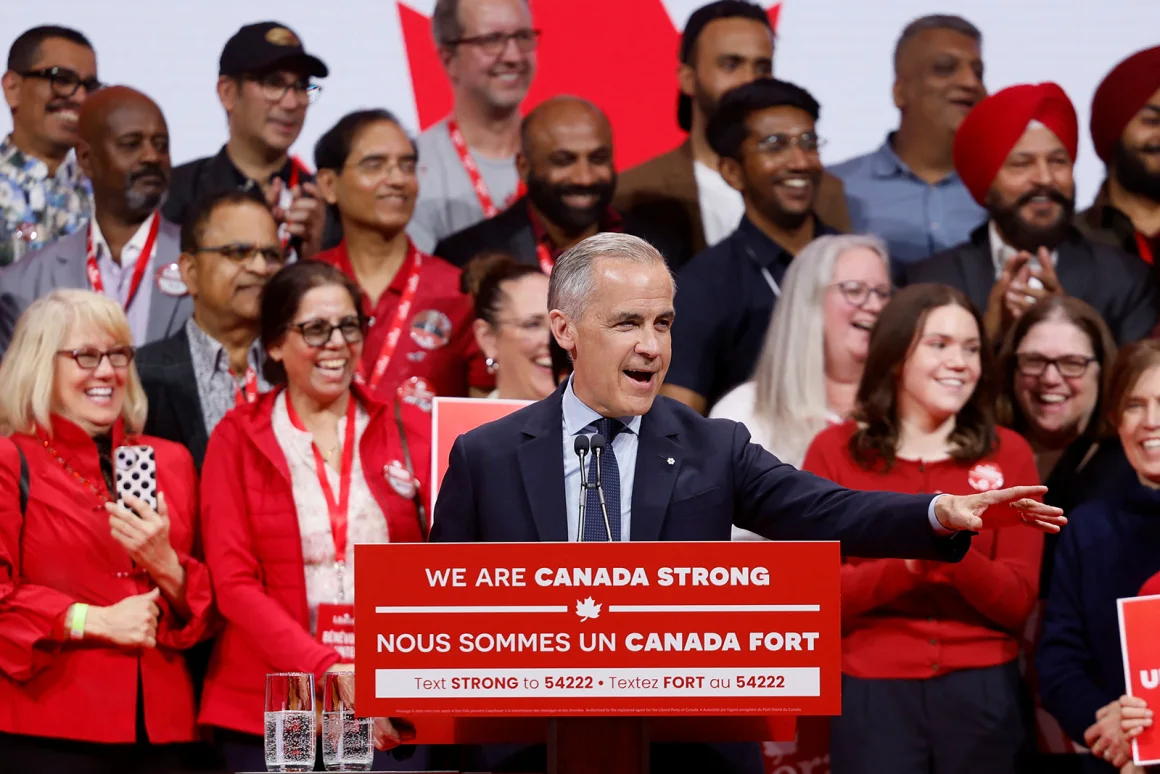
Analyzing Carney’s Bold Statement
Mark Carney’s assertion that “Trump is trying to break us” is a significant statement that warrants closer examination. It reflects Carney’s perception of the threat posed by the former U.S. president.
Context and Timing of the Warning
The timing of Carney’s warning is crucial. It came at a moment when Canada was navigating complex trade negotiations and diplomatic relations with the U.S.
The context suggests that Carney was not only addressing immediate concerns but also preparing Canadians for potential future challenges.
Specific Threats Identified by Carney
Carney specifically highlighted the risks associated with Trump’s protectionist policies and their potential impact on Canada’s economy.
He emphasized the need for Canadians to be aware of these threats and to stand united against policies that could harm their economic interests.
Public Reaction to the Warning
The public’s response to Carney’s warning was varied, reflecting the diverse perspectives within Canada.
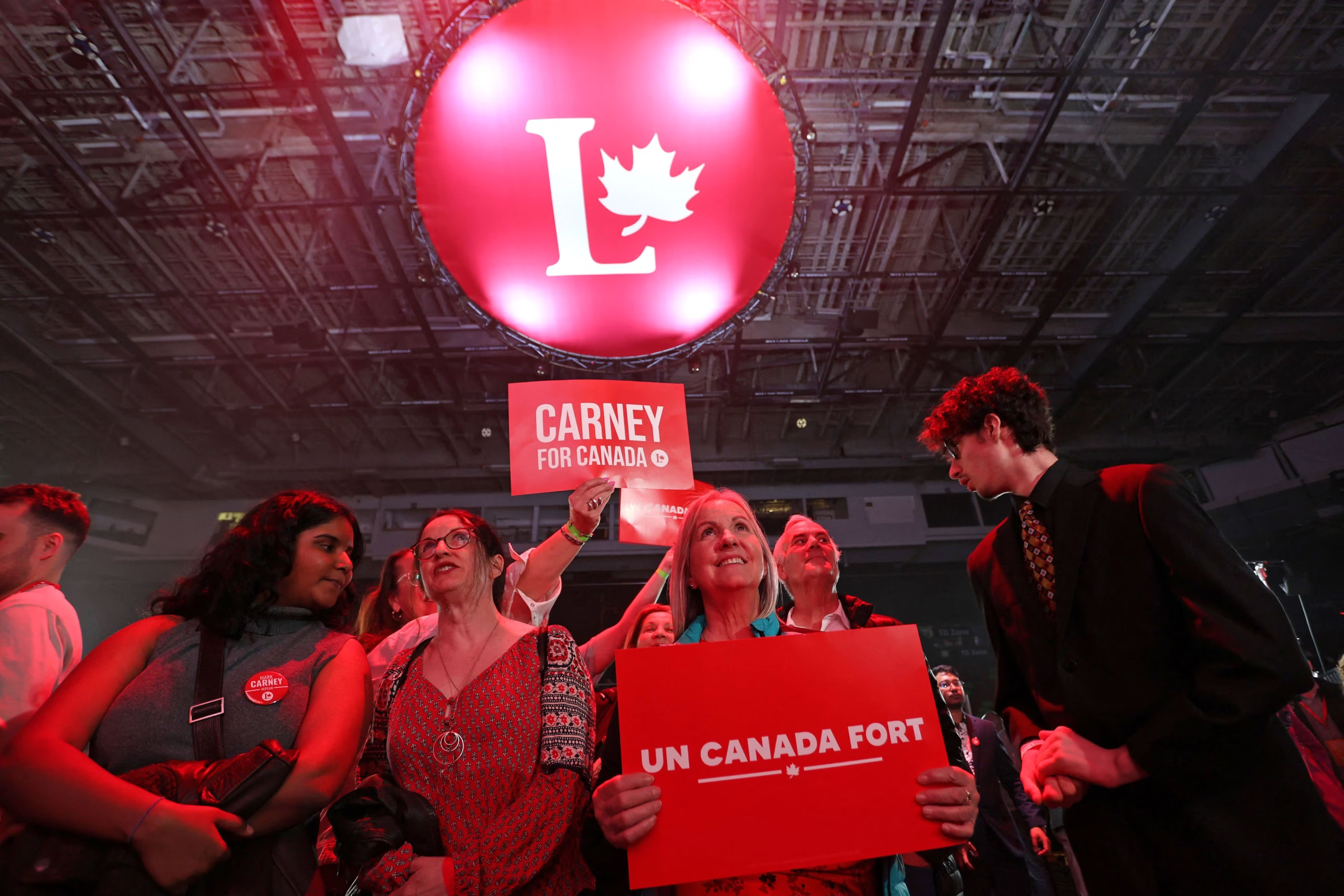
Canadian Media Response
The Canadian media largely supported Carney’s statement, with many outlets echoing his concerns about Trump’s policies.
Editorials and news analyses highlighted the potential risks and urged Canadians to consider the implications of Trump’s actions.
International Coverage
Internationally, Carney’s statement garnered significant attention, with many news agencies reporting on the potential implications for Canada-U.S. relations.
The coverage underscored the global interest in the dynamics between the two nations and the potential impact on international trade.
| Media Outlet | Response to Carney’s Warning |
|---|---|
| Canadian Press | Supported Carney’s concerns about Trump’s policies |
| Globe and Mail | Highlighted the need for Canadians to be aware of the threats |
| New York Times | Reported on the international implications of Carney’s statement |
The Formation of a Minority Government: Challenges and Opportunities
The 2025 election outcome has positioned the Liberals to lead a minority government, a scenario fraught with both challenges and opportunities. As the Liberal party returns to power, they must navigate the complexities of coalition building in the Canadian Parliament.
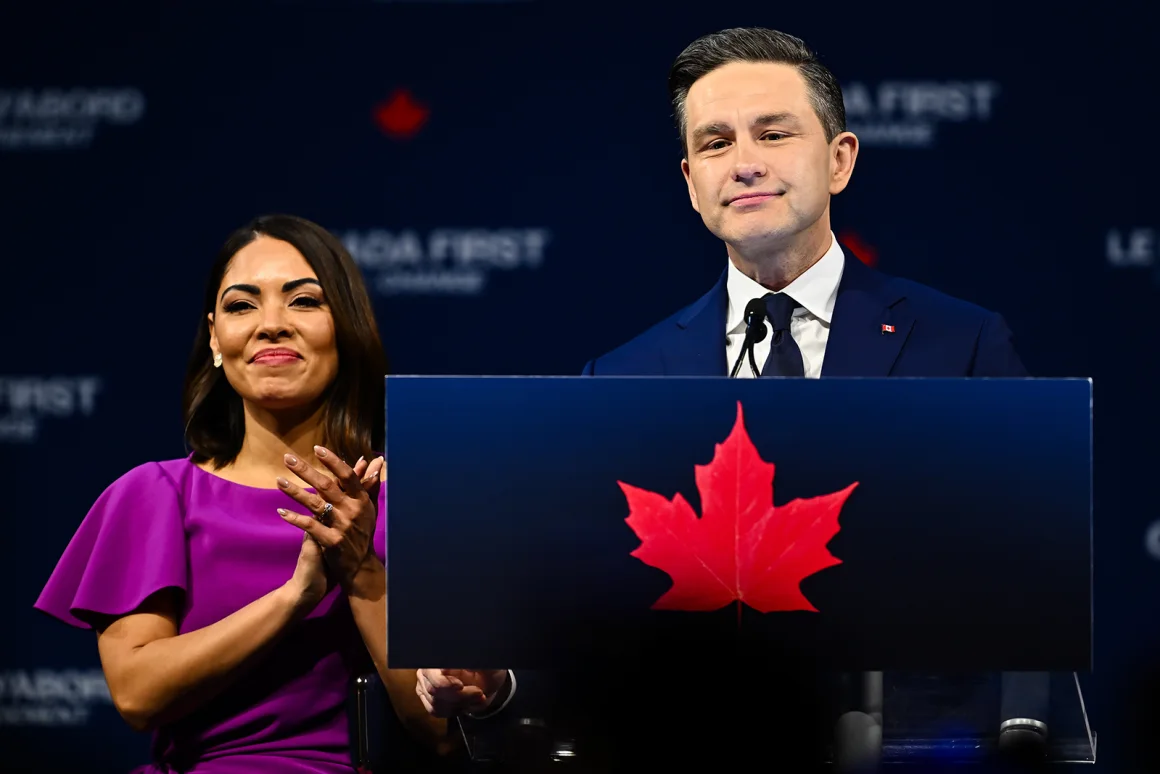
Coalition Building in Canadian Parliament
To pass legislation, the Liberals will need to form alliances with other parties. This requires identifying potential partners and negotiating legislative priorities.
Potential Partners for the Liberals
The Liberals may look to the NDP or other smaller parties to form a coalition. Potential partners will be crucial in helping the Liberals pass key legislation.
Legislative Priorities and Compromises
The Liberals must balance their legislative priorities with the demands of their coalition partners. This may involve making compromises on key issues.
Historical Context of Minority Governments in Canada
Canada has a history of minority governments, providing valuable lessons for the current Liberal administration. Understanding the successes and challenges of past minority governments can inform the Liberals’ approach.
Previous Liberal Minorities Under Trudeau
Under Trudeau, the Liberals have experience governing in a minority Parliament. This experience will be crucial in navigating the current political landscape.
Lessons from Past Minority Parliaments
Past minority governments have shown that coalition building and compromise are key to success. The Liberals can draw on these lessons to inform their strategy.
The formation of a minority government presents both challenges and opportunities for the Liberal party. By understanding the historical context and navigating coalition building effectively, the Liberals can achieve their legislative priorities.
- The Liberals must identify potential partners for coalition building.
- Legislative priorities will need to be balanced with the demands of coalition partners.
- The historical context of minority governments in Canada provides valuable lessons.
Pierre Poilievre’s Future as Conservative Leader
As the dust settles on the 2025 Canadian election, Pierre Poilievre faces a critical test of his leadership. Despite his party making gains in the Toronto area and B.C., Poilievre is projected to lose his suburban Ottawa riding to a Liberal candidate.
The Impact of Losing His Own Riding
Losing his own riding could have significant implications for Poilievre’s leadership. It raises questions about his ability to represent his constituents and his own electoral viability.
Precedents for Leaders Without Seats
Historically, Canadian party leaders have sometimes found themselves without a seat in Parliament. For instance, Ernest Manning, the former leader of the Social Credit Party, was a senator rather than an MP. However, this is not a common occurrence and can lead to scrutiny.
Options for Returning to Parliament
Poilievre has several options to return to Parliament. He could run in a by-election if a seat becomes vacant or be appointed to the Senate, although the latter is less likely given his political profile. Another possibility is for a current MP to step down, allowing him to run in the subsequent by-election.
Conservative Party’s Regional Strengths
The Conservative Party under Poilievre has shown regional strengths, particularly in the Toronto area and B.C., where they made significant gains. This indicates a strong base of support in these regions.
| Region | Seats Gained | Seats Lost | Net Change |
|---|---|---|---|
| Toronto Area | 15 | 5 | +10 |
| B.C. | 10 | 3 | +7 |
| Suburban Ottawa | 2 | 5 | -3 |
Poilievre’s Strategy Moving Forward
To maintain his leadership, Poilievre will need to strategize effectively. This could involve focusing on the party’s regional strengths, rebuilding in areas where they lost ground, and potentially rebranding his leadership image.
The Bloc Québécois: Diminished but Influential
In the aftermath of the 2025 Canadian election, the Bloc Québécois emerges as a crucial, albeit diminished, force. Despite not being as robust as in previous elections, the party remains significant in Quebec.
The Bloc’s Performance in Quebec
The Bloc Québécois has seen a shift in its voter base, with some key victories and defeats. Key Victories and Defeats were evident in several Quebec ridings.
Key Victories and Defeats
The party won crucial seats in traditionally strong areas but lost ground in others due to changing voter sentiments.
Shifting Voter Base
The Bloc’s voter base is evolving, with younger voters showing increased support in some regions.
Potential Power in a Minority Parliament
In the context of a minority government, the Bloc Québécois could wield considerable influence.
Bargaining Position with Liberals
The Bloc is likely to negotiate with the Liberals, potentially securing concessions for Quebec.
Quebec-Specific Demands
These may include increased funding for Quebec-specific projects and policies tailored to the province’s unique needs.
The NDP’s Collapse and Jagmeet Singh’s Departure
The NDP’s collapse in the 2025 Canadian election was a shocking development, culminating in the loss of official party status. This unexpected turn of events has left the party reeling and facing an uncertain future.
Losing Official Party Status: Implications
The loss of official party status has significant implications for the NDP, both financially and procedurally. Without this status, the party faces reduced funding and limited speaking rights in Parliament.
Financial and Procedural Consequences
The financial implications are substantial, as the party will receive less funding. Procedurally, the NDP will have limited opportunities to shape the legislative agenda.
Historical Context of NDP Setbacks
Historically, the NDP has faced setbacks, but the current situation is particularly challenging. The party must now regroup and redefine its strategy.
| Consequences | Impact on NDP |
|---|---|
| Loss of Official Party Status | Reduced Funding and Limited Speaking Rights |
| Financial Implications | Substantial Reduction in Party Funding |
| Procedural Implications | Limited Opportunities to Shape Legislative Agenda |
Singh’s Legacy and the Search for New Leadership
Jagmeet Singh’s tenure as leader was marked by significant efforts to revitalize the party. However, his departure has left a void that needs to be filled.
Singh’s Tenure as Leader
Singh’s leadership was characterized by his commitment to social justice and progressive policies. His legacy will be remembered for its impact on Canadian politics.
Potential Successors and Party Direction
The search for new leadership will be crucial in determining the party’s future direction. Potential successors will need to navigate the challenges facing the NDP and chart a new course.
“The NDP’s collapse is a wake-up call for progressive forces in Canada. We must regroup and come back stronger.” – Anonymous NDP Official
As the NDP navigates this challenging period, the party’s ability to adapt and evolve will be crucial in determining its future success.
Canada-US Relations Under Carney and Trump
Mark Carney’s warning that “Trump is trying to break us” underscores the tense backdrop against which Canada-US relations are evolving. As Canada navigates its new political landscape under Carney’s leadership, the dynamics with the US, particularly under Trump’s presidency, are expected to be complex and potentially challenging.
The History of Trump’s Approach to Canada
During his first administration, Trump demonstrated a distinct approach to Canada, primarily focusing on trade policies.
First Trump Administration’s Trade Policies
The Trump administration implemented several trade policies that directly impacted Canada, including the renegotiation of NAFTA into the USMCA. Tariffs on Canadian steel and aluminum were also a significant point of contention.
Campaign Rhetoric Targeting Canada
Trump’s campaign rhetoric often targeted Canada, criticizing its trade practices and labeling Canada as a significant beneficiary of unfavorable trade deals. This rhetoric set the stage for a challenging bilateral relationship.
Carney’s Experience in International Finance and Diplomacy
Mark Carney brings a wealth of experience in international finance and diplomacy to his new role, having served as the Governor of the Bank of England and previously as the Governor of the Bank of Canada.
G7 and G20 Connections
Carney’s involvement in G7 and G20 meetings has provided him with a platform to engage with world leaders, including US officials, on critical economic issues. His experience in these forums will be invaluable in navigating Canada-US relations.
Personal Relationship with US Officials
Having worked closely with international counterparts, Carney has established relationships that could facilitate dialogue with US officials, potentially easing some of the tensions in bilateral relations.
Potential Flashpoints in Bilateral Relations
The Canada-US relationship under Carney and Trump may face several flashpoints, including trade disputes, border policies, and energy exports. Key areas of contention include:
- Trade policies and tariffs
- Border security and immigration policies
- Energy exports and environmental policies
As the situation evolves, Canada will need to navigate these challenges carefully to protect its interests while maintaining a productive relationship with the US.
The Tariff War: Economic Implications for Both Nations
The US-Canada tariff war is a complex issue with profound economic implications for both nations. As trade tensions escalate, understanding the potential consequences is crucial for businesses, policymakers, and consumers alike.
Trump’s Tariff Threats and Actions
Former President Trump’s tariff threats and actions have been a significant point of contention in US-Canada trade relations. The imposition of tariffs on Canadian goods has raised concerns about the impact on various industries.
Targeted Industries and Products
Tariffs imposed by the Trump administration have targeted key Canadian export sectors, including aluminum and steel. The automotive industry has also been affected, with General Motors issuing a “significant” warning about the potential consequences of tariff hikes.
Legal Framework Under USMCA
The United States-Mexico-Canada Agreement (USMCA) provides a legal framework for trade between the three nations. However, Trump’s tariff actions have raised questions about the effectiveness of this agreement in preventing trade disputes.

Canada’s Economic Vulnerability and Strengths
Canada’s economy is heavily reliant on exports, making it vulnerable to trade disruptions. However, Canada also has certain strengths that could be leveraged in negotiations.
Export-Dependent Sectors at Risk
Sectors such as forestry and agriculture are particularly vulnerable to US tariffs. These industries are significant contributors to Canada’s economy and job market.
Leverage Points in Negotiations
Canada can leverage its strategic position in the North American supply chain to negotiate favorable trade terms. Additionally, Canada’s commitment to free trade agreements and multilateral cooperation can be a bargaining chip in trade talks.
Carney’s Cabinet: Who Will Shape Canada’s Response to Trump?
The composition of Mark Carney’s cabinet is being closely watched, particularly in terms of how it will navigate the complex Canada-US relations under Trump’s presidency. As Canada faces potential challenges from its southern neighbor, the cabinet’s makeup will be crucial in determining the country’s response.
Key Ministerial Positions to Watch
The selection of ministers for key portfolios will be vital in shaping Canada’s strategy. Two areas of particular interest are:
- Finance and International Trade
- Foreign Affairs and US Relations
Finance and International Trade Portfolios
The ministers responsible for finance and international trade will play a pivotal role in negotiating trade agreements and responding to Trump’s tariff policies. Their experience in international finance will be crucial in navigating these complex issues.
Foreign Affairs and US Relations
The minister handling foreign affairs and US relations will need to balance diplomacy with firmness, ensuring that Canada’s interests are protected while maintaining a working relationship with the US.
The Balance of Experience and Fresh Perspectives
Mark Carney’s cabinet is expected to strike a balance between experienced politicians and fresh faces. This balance will be essential in bringing both stability and innovative solutions to the challenges posed by Trump’s administration.
Cabinet Diversity and Regional Representation
A diverse cabinet with strong regional representation will be better equipped to address the varied concerns across Canada. This diversity will ensure that the government’s policies are inclusive and effective.
The Promised Trade Talks: Strategy and Expectations
With the promise of trade talks between Canada and the U.S., the world watches as Mark Carney navigates a complex diplomatic landscape. The Swiss president recently indicated that the US plans to conduct “privileged” negotiations with 15 countries, highlighting the significance of these trade talks.
Carney’s Approach to Negotiating with Trump
Mark Carney’s negotiation strategy with Trump will be crucial in determining the outcome of the trade talks. His experience as a central banker and his understanding of international finance will likely play a significant role in shaping Canada’s position.
Economic vs. Political Considerations
Carney must balance economic and political considerations during the trade negotiations. Economic factors such as tariffs, trade balances, and market access will be critical. At the same time, political considerations, including the potential impact on Canadian industries and the overall bilateral relationship, will also be important.
Carney’s Banking Background as an Asset
Carney’s background in banking is expected to be an asset in the trade talks. His experience in managing economic crises and his understanding of financial markets will help him navigate the complex negotiations. This background, combined with his diplomatic efforts, may lead to more favorable outcomes for Canada.
Key Issues on the Table
The trade talks between Canada and the U.S. will cover several key issues, including:
- Tariffs and trade barriers
- Market access for Canadian goods and services
- Dispute resolution mechanisms
- Regulatory cooperation
These issues are critical to the success of the trade negotiations and will require careful consideration by both parties.

Potential Outcomes and Timelines
The outcome of the trade talks will depend on various factors, including the negotiating strategies employed by both sides and the political will to reach an agreement. While it is difficult to predict the exact outcome, a successful negotiation could lead to improved trade relations and economic benefits for both Canada and the U.S.
The timeline for the trade talks is also uncertain, but it is expected that both countries will work towards a resolution in the near future. The success of these negotiations will be closely watched by the international community, given the significance of the Canada-U.S. trade relationship.
Canadian Unity in the Face of External Pressure
In light of Mark Carney’s candid warning to Canadians about Trump’s intentions, the country’s ability to present a united front against external pressures is being closely examined. As Canada navigates the complexities of its relationship with the US, maintaining national unity is crucial.
Regional Divisions and Common Interests
Canada is not a monolith; it has diverse regional interests that sometimes converge and sometimes diverge. Provincial perspectives on US relations vary significantly, with some provinces being more heavily impacted by US trade policies than others.
Provincial Perspectives on US Relations
- Provinces like Ontario and Quebec, with their significant manufacturing sectors, are particularly vulnerable to US trade policies.
- Alberta, with its oil exports, is directly affected by US energy policies and tariffs.
- British Columbia and the Maritime provinces have their own set of concerns, often related to environmental and fisheries issues.
Industry-Specific Concerns Across Canada
Different industries across Canada have unique concerns when it comes to US relations. For instance:
- The agricultural sector is worried about US subsidies and trade barriers.
- The automotive industry is concerned about tariffs on auto parts and vehicles.
The Role of National Identity in Trade Disputes
Canada’s national identity and its historical patterns of response to US pressure play a significant role in shaping its approach to trade disputes.
Historical Patterns of Canadian Response to US Pressure
Historically, Canada has responded to US pressure by emphasizing its sovereignty and distinctiveness. This has been evident in various trade disputes where Canada has sought to protect its interests while maintaining a delicate balance in the bilateral relationship.
Rallying Public Support for a United Front
To effectively counter external pressures, Canada needs to rally public support behind its trade policies. This involves clear communication of the issues at stake and the measures being taken to protect Canadian interests.
Conclusion: The Path Forward for Canada Under Carney’s Leadership
With Mark Carney’s victory in the 2025 Canadian federal election, the country is poised to navigate a complex geopolitical landscape, particularly in its relations with the United States under the shadow of Donald Trump’s presidency. Carney’s leadership is expected to play a crucial role in shaping Canada-US relations, a critical aspect of Canadian politics in 2025.
Carney’s experience in international finance and diplomacy positions him well to address the challenges posed by Trump’s protectionist policies and potential tariff wars. The formation of a minority government will require coalition building and strategic negotiations, both domestically and internationally.
As Canada moves forward under Carney’s leadership, the focus will be on maintaining national unity in the face of external pressures. The ability to balance regional divisions and common interests will be crucial. Carney’s cabinet, with its blend of experience and fresh perspectives, is expected to play a key role in shaping Canada’s response to the challenges ahead.
The path forward will involve careful diplomacy and strategic trade negotiations. Under Carney’s leadership, Canada is likely to prioritize maintaining a strong, independent voice in international affairs while navigating the complexities of its relationship with the US.
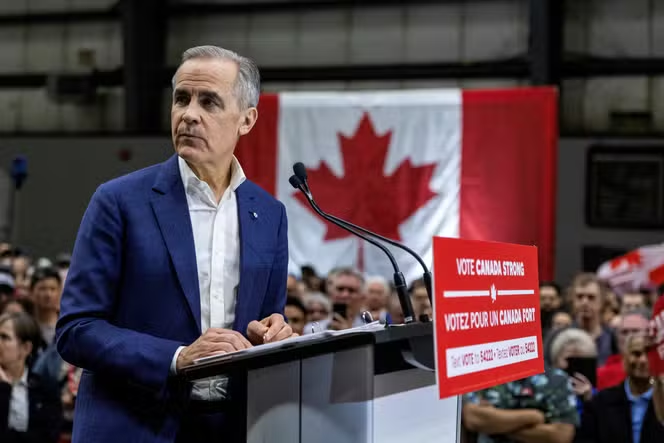
FAQ
What was Mark Carney’s message to Canadians in his victory speech?
Mark Carney warned Canadians that “Trump is trying to break us,” highlighting the potential threats to Canadian unity and the country’s relations with the US under Trump’s leadership.
How did the Canadian public react to Mark Carney’s warning about Trump?
The public reaction was mixed, with some Canadians expressing concern about the potential implications of Trump’s policies, while others were more skeptical about the severity of the threat.
What are the implications of a minority government in Canada, and how might it affect Canada-US relations?
A minority government may lead to a more complex and potentially unstable political environment, which could impact Canada’s ability to negotiate with the US and respond to Trump’s policies.
What are the potential flashpoints in Canada-US bilateral relations under Carney and Trump?
Potential flashpoints include trade disputes, border security, and climate change, among other issues, which could be exacerbated by Trump’s approach to Canada.
How might Mark Carney’s experience in international finance and diplomacy influence Canada’s response to Trump?
Carney’s background and expertise may enable Canada to take a more informed and strategic approach to negotiating with the US, potentially mitigating the impact of Trump’s policies.
What are the economic implications of a tariff war between the US and Canada?
A tariff war could have significant economic implications for both countries, potentially leading to increased costs for consumers, reduced trade, and economic instability.
How might the Bloc Québécois’s performance in Quebec impact Canadian politics?
The Bloc Québécois’s influence in a minority parliament could be significant, potentially allowing them to shape key policy decisions and extract concessions from the Liberal Party.
What are the implications of the NDP’s collapse and Jagmeet Singh’s departure for Canadian politics?
The NDP’s loss of official party status could lead to a significant shift in the Canadian political landscape, potentially creating opportunities for other parties and impacting the balance of power in Parliament.
How might Pierre Poilievre’s future as Conservative Leader be affected by his loss in his own riding?
Poilievre’s loss could potentially weaken his position as Conservative Leader, although he may still have options for returning to Parliament and maintaining his leadership role.
What are the key issues on the table in the promised trade talks between Canada and the US?
Key issues may include tariffs, trade agreements, and other economic matters, which will be critical in determining the future of Canada-US trade relations.
How might Canadian unity be affected by external pressure from the US under Trump’s leadership?
Canadian unity may be tested by external pressure, potentially exacerbating regional divisions, although a strong national identity and common interests may also help to unite Canadians in the face of external challenges.









